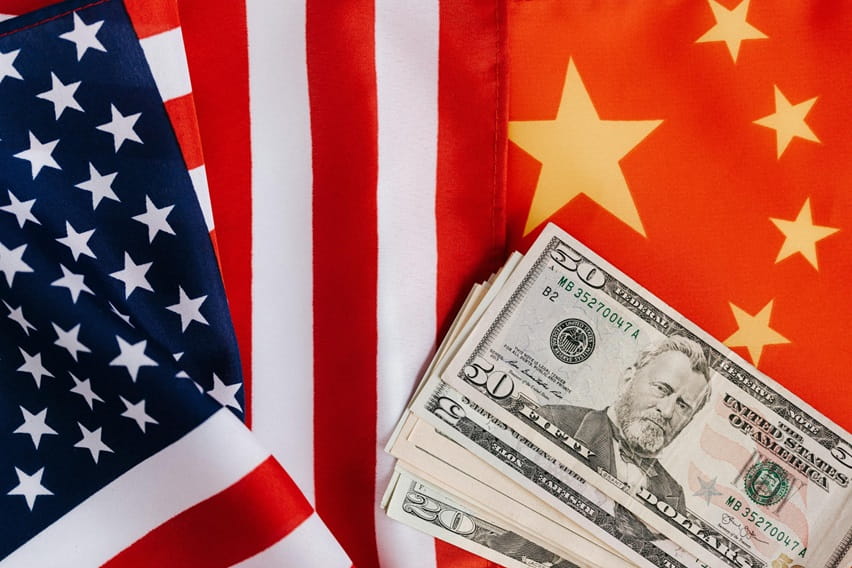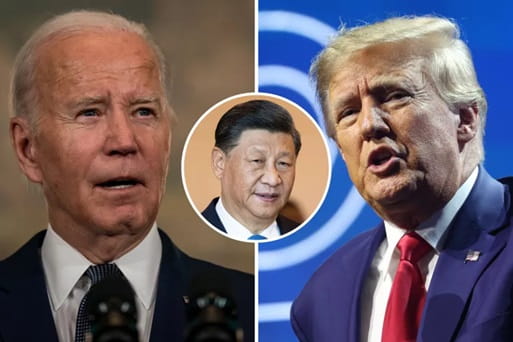
US and China Policy - A need for a comprehensive review by Washington
No matter how hard the US tries, it will not be possible to project China as a global threat and build a powerful coalition to counter an assertive China. In other words, US policy towards China is intricately linked to the cause of revisiting its overall foreign policy. Will the new administration be willing to engage in such an exercise? As things stand today, they look increasingly unlikely.
The recent meeting between US Secretary of State Anthony Blinken and Chinese Foreign Minister Wang Yi on the sidelines of the 31st ASEAN Regional Forum (ARF) Foreign Ministers' meeting indicates that US-China relations continue to be gripped with 'strategic mistrust.' The US side has reiterated its concerns about the Chinese support to Putin's Russia in building its defence capabilities and threatening Europe's security. On the other hand, the Chinese side called out the US for doubling down on its containment and suppression of China.
This war of words indicates little has changed despite a marked improvement in high-level exchanges in the last two years.
What will the likely trajectory of bilateral ties between the two countries be in the event of a Republican victory under Donald Trump's leadership? This article will highlight some of the policy choices the new dispensation will face in shaping Washington's China policy. The article concludes by highlighting the limits of US foreign policy in walking its talk.
'Outright victory' or 'Managing Conflict?'
The victory of the Republican Party under Trump is likely to bring to the forefront a group of advisors who believe in a far more aggressive approach toward China. Known as 'new Cold War warriors,' this group comprises former Trump advisers like Matt Pottinger, Mike Gallagher, Peter Navarro, Mike Pompeo and Robert Spalding. This group has been very vocal about Biden's policy towards China, which is characterised as one laced by the 'managing conflict' policy. For instance, Pottinger and Gallagher contend that the 'managing conflict' policy emphasises 'process over outcomes' and prioritises bilateral security over global security. Dismissive of the current approach, they call for an 'uncomfortably confrontational' policy towards China.
Brigadier Robert Spalding, part of Trump's National Security Strategy team in 2017, has advocated a completely new approach towards China. His recipe for China comprises three parts. US policy should move from a rules-based order to an interest-based one. Spalding argues that the US, the chief architect of the rules-based liberal international economic order (RB LIEO), is bound to get defeated owing to its adherence to the system it has built. Therefore, the US should do anything and everything to pursue its interests.
Second, the US should reformulate its China strategy by shifting from defensive to offensive approaches. Measures like Biden's CHIPS and Science Act, 'small yard and high fences' are, at best, defensive measures in a globally interconnected world and are insufficient to deal with the threat of China. Spalding cites the case of TikTok, which has been under the scanner in the US for the last few years, by contending that such platforms provide a huge advantage to the CCP in perfecting algorithms and collecting data on individual US citizens, endangering US national security. He further argues that China's growing influence is far more menacing than many of the confrontational policies pursued by the erstwhile USSR during the Cold War.
Third, there is a need to craft a China strategy that marks a radical shift from 'finite to infinite.' Elaborating on this, Spalding argues that Western warfare techniques are based on envisioning conflicts phase-wise. In contrast, the Chinese approach to war is based on a policy of infiniteness spanning decades. This policy can be linked to the ancient Chinese game of 'Go,' where the main objective is not to achieve an outright victory but to 'keep playing' till the enemy gets encircled from all quarters. Therefore, to combat the Chinese, the US needs to up its ante and shift gears from a policy based on finiteness to infiniteness.
The proponents of an 'outright victory' approach have faced severe pushback from the 'managing conflict' policy advocates. While conceding that China is an aggressive actor and a significant global threat to the US and its allies, influential China policymakers in the current Biden administration, like Jake Sullivan, National Security Advisor and Kurt Campbell, US Deputy Secretary of State, Rush Doshi, Director of the Initiative on China Strategy at the Council on Foreign argue that US policy towards China should be based on competition without catastrophe approach.
Someone like Rush Doshi, a senior adviser in the White House, advocates that the US should display 'tactical reassurance' addressing specific issues to develop a robust policy towards China. The final endgame for the US should be to protect its and its allies' interests rather than seek to fundamentally engineer China's political transformation. Given China's significant industrial strength, striving to achieve an 'outright victory' is too ambitious and does not serve US interests.
Further, a very hawkish stance towards China, exemplifying a 'us versus them' approach, may antagonise American interests by alienating certain US partners who would not like to take sides between either of the two sides. These policy debates are related to yet another set of foreign policy challenges bearing severe implications for the US' China policy.
Therefore, one of the most critical policy choices for the incoming US administration would be whether it will make significant investments to add teeth to its existing alliances to counter the China threat or seek a decisive say, keeping its foreign policy agendas in mind.
Unilateral versus Alliance-policy
In terms of the likelihood of Trump's victory, given his earlier stint in the White House, it will be interesting to see whether Trump will take an all-out approach to demonise China and will not mind ruffling the feathers of US allies in Europe.
Trump's earlier policy towards some of the European allies left a bitter taste, and his NATO policy will directly affect his China policy. In his new term, to what extent will the Trump administration give weightage to groupings like the QUAD and AUKUS? Further, in his electoral campaign, Trump repeatedly emphasised that he does not favour the arrangement of security alliances with negligible costs for the beneficiaries.
Such a policy will significantly impact the US mobilisation of broader international support for its cause against China and, if not managed well, will neutralise the most strident of US policies towards China. A significant component of China's policy is trade.
Given the deep integration of China in international trade and commerce, the new administration's trade policy is bound to impact the trade ties of other countries with China. Further, whether Washington's policy would be motivated by merely an economic war or war on multiple fronts.
'Economic War’ or an ‘All-round War'
Despite economic globalisation suffering some reversals, the world is primarily intertwined by international trade and commerce. The US-China trade wars have significantly disrupted global value chains. The previous Trump regime's trade policy was based on a zero-sum approach focused on unilateral gains anchored in the slogan of Make America Great Again (MAGA). This policy rocked the foundations of the US-China relationship, with the administration paying great attention to the bilateral economic ties. Trade with China was viewed as threatening American interests and resulted in disrupting tech supply chains and the erection of tariffs. During Biden's term, US policy towards China became broader, including military security and human rights concerns. This new approach has deepened 'strategic mistrust,' causing hardening stances from both sides, where each side dug in their heels and refused to budge from their respective positions.
Whether the new administration will focus on the economic aspect of the ties and will further harden the US trade policy to dent Chinese interests or the net will be cast wider, further fuelling a more profound sense of distrust is something we must wait and watch.
A significant part of the trade war unfolded in the form of the tech war. There is already a deep sense of uneasiness in US policy circles regarding the revival of Huawei despite the choking of the supply of chips for the Chinese semiconductor industry. So, will we witness a far more radical policy to check China's tech capabilities? Another source of concern is the talk of China's over capacities and allegations of dumping. These tensions have manifested in what is already being projected as a green tech war. The US tariffs on imports of EVs, lithium batteries and solar panels are having a spillover effect on US commitments to using renewable energy and supporting the cause of climate change.
The current US policy is already unclear owing to the contradictions borne out of its support for the cause of addressing the challenge of global warming on the one hand and fears of encouraging the cheap supply of EVs, lithium batteries and solar panels at the cost of building its domestic capacities and addressing the cause of employment. If Trump storms back to power, this confusion may be addressed thanks to his dismissive approach to climate change. But what it would mean for the US-China green tech war is far from clear.

US President Joe Bide, Chinese President Xi Jinping and former US President Donald Trump. | KENT NISHIMURA/LAUREN DECICCA/SCOTT OLSON GETTY IMAGES.
No matter which administration is voted to power, it is evident that US policy towards China lacks consistency, and influential constituencies are also not very sure of the nature of China's threat to the US. While the absence of a consistent and coherent China policy will do no good to the US, a far more significant challenge awaits the US in garnering more comprehensive international support for its China policy.
The US is significantly challenged in multiple ways to stitch strong alliances to executive its apparent policy of containing China. First, the US does not have the same capability it had in the immediate aftermath of the Cold War to broaden its coalition. If Trump comes to power, this challenge will be far more significant given his record of antagonising even US trusted allies. Second, the US can no longer 'buy out' political loyalties. Trump has been unequivocal about his government policy towards those enjoying the US security umbrella without paying anything in return.
Finally, no matter how hard the US tries, it will not be possible to project China as a global threat and build a powerful coalition to counter an assertive China. In other words, US policy towards China is intricately linked to the cause of revisiting its overall foreign policy. Will the new administration be willing to engage in such an exercise? As things stand today, they look increasingly unlikely.
(Exclusive to NatStrat)